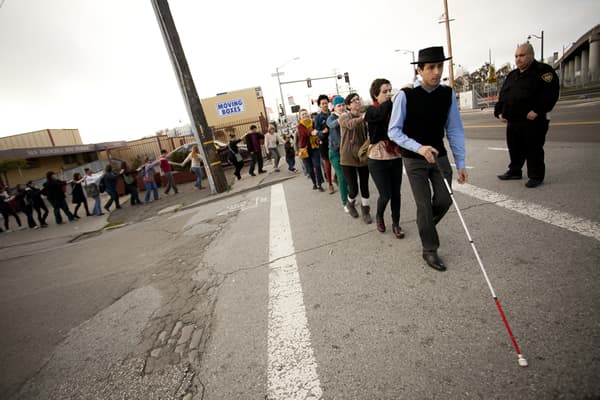
Each year, the UNC Charlotte Department of Art & Art History partners with the McColl Center for Art + Innovation to provide a special educational experience for students through hosting a shared artist-in-residence. The McColl artist joins a UNC Charlotte faculty member to teach a spring semester course, culminating in programming in Rowe Galleries and at McColl Center.
The fall 2017 artist-in-residence is Vancouver-based artist and disability activist Carmen Papalia. He is a social practice artist and nonvisual learner who makes participatory projects about access to public space, the art institution and visual culture.
In 2015, responding to the failures that he experienced as a recipient of institutional support services, Papalia proposed a new conceptual work called “Open Access.” Consisting of five tenets that describe a relational practice concerning the agreement to support others, “Open Access” fosters care, mutuality and the responsibility to disrupt the conditions that obstruct agency for those in need.
This fall, Papalia will conduct a teaching residency as part of his cross-country campaign for “Open Access.” Working with faculty members Janet Williams and Thomas Schmidt, Papalia will support students in answering “How do we use our creative practices – and the resources that we have access to as artists – to disrupt the disabling social, cultural and political conditions that obstruct our agency?”
Papalia is the recipient of the 2014 Adam Reynolds Memorial Bursary and the 2013 Wynn Newhouse Award. He holds a Bachelor of Arts from Simon Fraser University in Vancouver and a Master of Fine Arts with a focus in art and social practice from Portland State University. His work has been featured at the Guggenheim Museum, New York; the Harvard Art Museums; the Tate Liverpool in England; the Grand Central Art Center, Santa Ana, California; and Gallery Gachet in Vancouver, Canada, among others.
His current work includes a multifunctional acoustic mobility device, which he is making with Sara Hendren’s “Investigating Normal” assistive technologies lab at Olin College of Engineering in Massachusetts, and “Let’s Keep in Touch” (2016), a collaboration with curator Whitney Mashburn that aims to set a precedent for critical haptic engagement to become a viable practice within contemporary art and criticism.
(Haptic communication recreates the sense of touch by applying forces, vibrations or motions to the user, according to Wikipedia.)